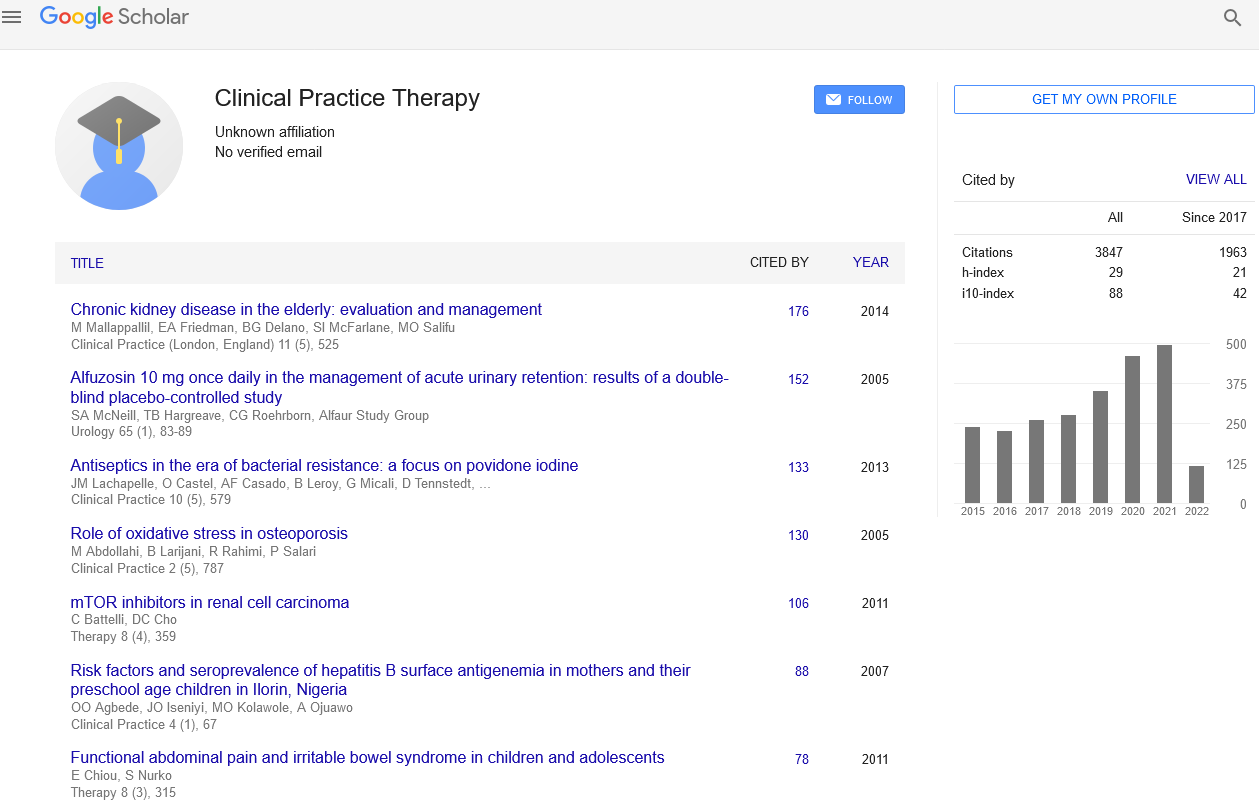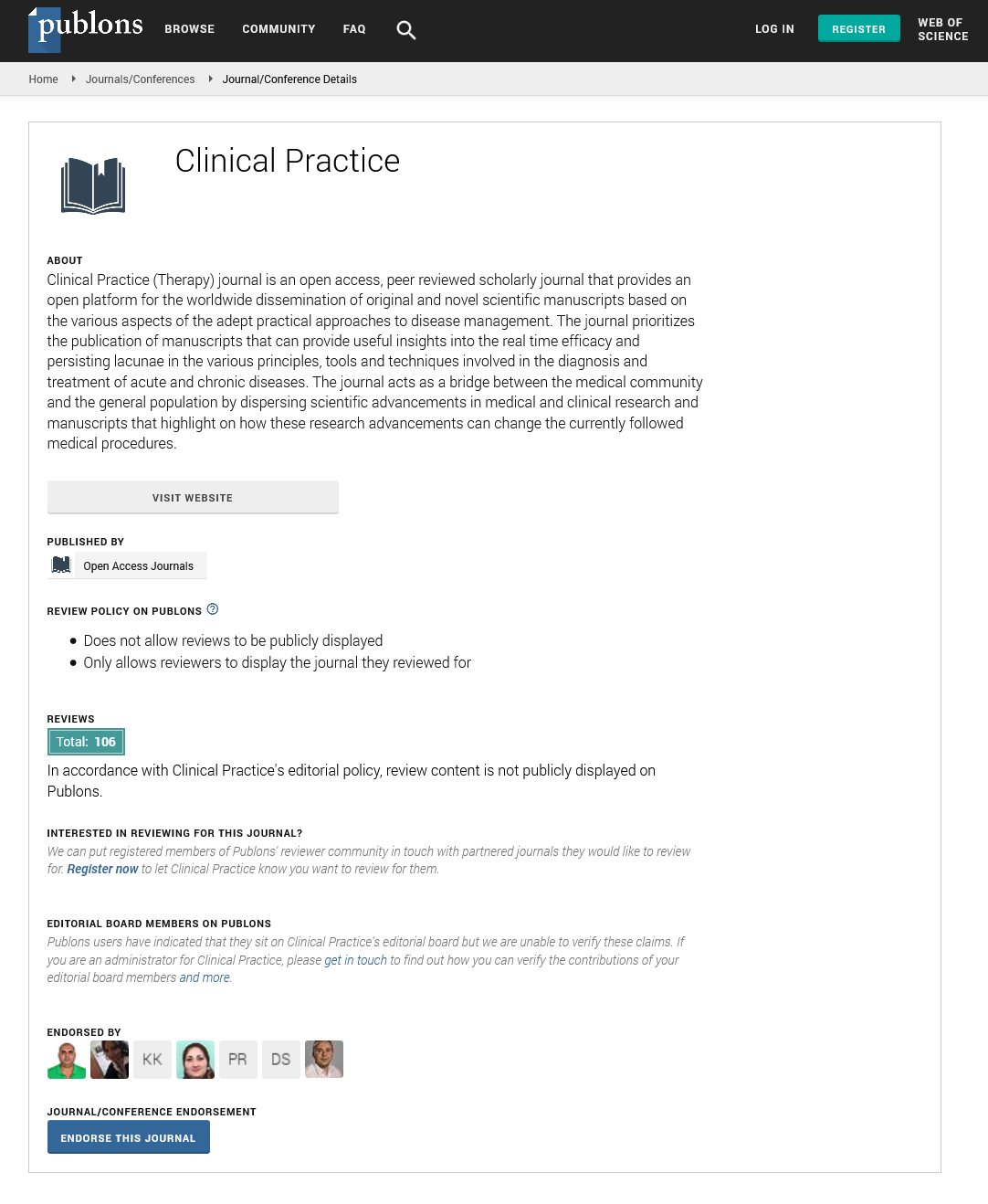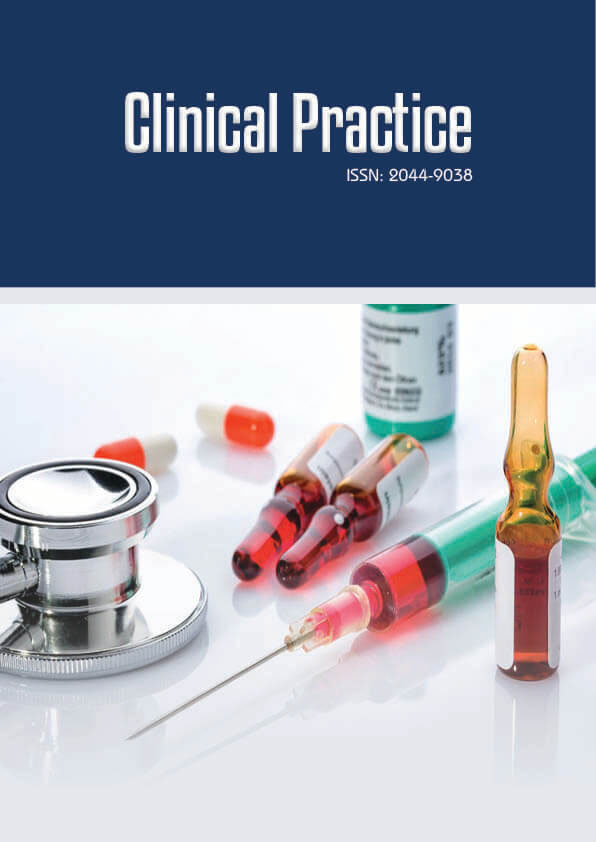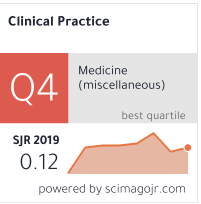Case Report - Clinical Practice (2019) Volume 16, Issue 3
Association of PTPN22 rs2476601 (R620W) polymorphism in Tunisian patients with atopic asthma
- Corresponding Author:
- Tarak Dhaouadi
Research Laboratory in Immunology of Renal Transplantation and Immunopathology (LR03SP01)
Charles Nicolle Hospital, Tunis El Manar University, Tunisia
E-mail: dhaouaditarak@yahoo.fr
Abstract
Background: PTPN22 (R620W) gene polymorphism (SNP) gene polymorphism has been associated with diverse inflammatory autoimmune diseases. Only a few studies investigated the influence of PTPN22 (R620W) SNP on atopic asthma risk, severity, and IgE levels. Methods: Therefore, PTPN22 rs2476601 (R620W) SNP was examined in 171 patients and 323 healthy subjects matched in age, sex and ethnicity. Results: The PTPN22-620*W variant was significantly more prevalent in patients (0.068) than to controls (0.009); p=1.24E-5, OR (95% CI)=7.69 (3.1-19.07). Analytic results showed that PTPN22*R/W and *W/W genotypes were significantly associated with a family history of atopy, p=0.014. Furthermore, asthma control was significantly worse in patients carrying these mutant genotypes, p=1.63E-7. Moreover, *R/W and *W/W genotypes were significantly correlated to higher levels of total and specific IgE; p=2.1E-3 and p=0.037, respectively. Besides, patients carrying PTPN22-620*R/W and *W/W genotypes had an earlier onset age comparatively to those with *R/R genotype but the difference was not significant, p=0.061. Conclusion: PTPN22 rs2476601 (R620W) polymorphism might influence asthma risk, disease control and IgE synthesis in Tunisian.
Keywords
Atopic, asthma, polymorphism, ptpn22
Abbreviations
Lyp: Lymphoid Protein Tyrosine Phosphatase; PCR: Polymerase Chain Reaction; RFLP PCR: Restricted Fragment-Length Polymorphism; PTPN22: Protein tyrosine phosphatase Non-receptor type 22
Introduction
Atopic asthma is a chronic inflammatory disorder of the respiratory tract characterized by recurrent episodes of coughing, wheezing and dyspnea and limitation of expiratory airflow [1]. According to the hygiene hypothesis [2], the immunological concept of asthma pathophysiology proposes that a lack of microbial exposure in early childhood leads to a Th2 polarization with reduced regulatory T cell (Treg) activity [3].
PTPN22, called also Lyp (Lymphoid tyrosine phosphatase), plays a regulatory role upon TCR activation [4]. PTPN22 gene exhibits Several Functional Polymorphisms (SNPs) [5]. Among, these SNPs, the rs2476601 SNP is due to a C/T nucleotide variation in 1858 position which results in a switch from arginine (R) to tryptophan (W) at position 620 [6]. This R620W variation impairs PTPN22 interaction with Csk (C-terminal Src Kinase) which results in a significant decrease of T cell regulation [6]. Several autoimmune diseases including Systemic Lupus Erythematosus, autoimmune diabetes, Graves’ disease, rheumatoid arthritis, etc. have been associated with this specific PTPN22 rs2466601 SNP [7]. Nonetheless, few studies investigated its impact on atopic diseases and asthma.
Thus, we aimed to assess the influence of PTPN22 rs2466601 SNP on atopic asthma risk, severity, and IgE levels.
Material and Methods
■Subjects
This study included 171 patients with atopic asthma and 323 healthy subjects exempt from any atopic disease. Patients have been collected from pneumonology department of the Charles Nicolle University Hospital in Tunis and pediatrics department of Tahar Sfar Hospital in Mahdia and were diagnosed according to the Global Initiative for Asthma (GINA) guidelines 2006 [1]. Clinical and biological characteristics of the 171 patients are shown in TABLE 1.
Controls were healthy blood donors matched with patients for age, sex, and ethnicity.
Written informed consent to be included in the present study has been obtained from all patients and controls. The Charles Nicolle Hospital’s local Ethics committee approved the present study.
■Blood sampling and genotyping
An ordinary salting-out procedure [8,9] have been performed for genomic DNA extraction from EDTA blood.
The PTPN22 rs2476601 polymorphism genotyping was achieved by a restriction fragment length polymorphism-polymerase chain reaction (RFLP-PCR) method. To a 10-uL PCR volume containing 50 ng DNA, 100 pmol of each primer, 1 U of Taq polymerase (Promega, USA), and 0.2 mmol/L of each deoxynucleoside triphosphate (dNTP) was added following primers: forward (5’-TGCCCATCCCACACTTTAT- 3 ’ ) and reverse (5’- ACCTCCTGGGTTTGTACCTTA-3’). Thermal cycling was performed with an initial activation step at 95°C for 15 minutes, 35 cycles of denaturation at 94°C for 1 minute, annealing temperature 55°C for 1 minute, extension at 72°C for 1 minute, and a final extension at 72°C for 10 minutes. The PCR product was incubated with 1 U enzyme RsaI (Promega, USA) in a 15-μL volume at 37°C for 1.5 hours. The PCR generated a 326 bp fragment containing a restriction site for RsaI, which permitted differentiation of the R620- allele (228 bp) and the 620W-allele (272 bp).
Statistical Analysis
The results of continuous quantitative variables (Age, Onset Age, and Total IgE level) are expressed as means ± SD or median (1st- 3rd quartiles), and the means (or median) of groups were compared by ANOVA-test, Mann- Whitney U and Kruskal-Wallis, as appropriate (SPSS 11 Inc. Chicago, Illinois, USA). For qualitative variables, the univariable analysis was performed using the chi-square test or Fisher's exact test for small numbers (Epiinfo Stat 7.1 program CDC, Atlanta). Probability (p) values were corrected for the number of tested alleles(pc). p-values <0.05 were considered as significant. In order to evaluate the strength of associations, the odds ratios (OR) together with 95% Confidence Intervals (CI) were calculated.
The Hardy-Weinberg equilibrium was confirmed for the studied SNP via the internet (http://ihg2.helmholtz-muenchen.de/cgi-bin/ hw/hwa1.pl).
Results
In total, this study included 171 atopic asthma patients and 323 healthy subjects. Mean age of the patients’ group was at 24.12 ± 14.25 years and the sex-ratio (Men/Women) was 0.78 (75/96). Mean onset-age was at 17.56 ± 14.04 years with 91 (53.2%) patients with an early onset before 16 years old. One hundred and ten (64.3) patients had associated atopic rhinitis and/or conjunctivitis and 61 (35.7%) had a family history of asthma and/or atopy. Using GINA criteria [1], 174 (86.5%) patients had controlled asthma, 13 (7.6%) had a partly controlled disease and 10 (5.8%) had severe uncontrolled asthma. Biologically, total IgE was ≥ 200 IU/ml in 90 (52.6%) patients with a median of 239 IU/ml (59-723). Specific IgE was positive in 116 (67.8%) patients with a median of the level of 17 IU/ml (0-89) (TABLE 1).
| Patients | N=171 |
|---|---|
| Age ± SD (years) | 24.12 ± 14.25 |
| Sex ratio (Males / Females) | 0.78 (75/96) |
| Onset age ± SD (years) | 17.56 ± 14.05 |
| Early onset before 16 years old | 91 (53.2%) |
| Exposure to tobacco | 50 (29.2%) |
| Associated atopy (rhinitis and/or conjunctivitis) | 110 (64.3%) |
| Family history of asthma and/or allergy | 61 (35.7%) |
| Asthma classification (GINA 2006) | |
| Controlled | 174 (86.5%) |
| Partly Controlled | 13 (7.6%) |
| Uncontrolled | 10 (5.8%) |
| Total IgE ≥ 200 IU/ml | 90 (52.6%) |
| Median Total IgE level [1st-3rd quartiles] (IU/ml) | 239 [59-723] |
| Specific IgE positive | 116 (67.8%) |
| Median Specific IgE level [1st-3rd quartiles] (IU/ml) | 17 [0-89] |
Table 1. Characteristics of atopic asthma patients.
Analysis of the PTPN22 rs2476601 polymorphism
The frequency of PTPN22*R/W and *W/W genotypes was significantly higher in patients (11.11% and 1.16%) comparatively controls (1.86% and 0); p=1.24E-5, OR (95% CI)=7.39 (2.92-18.07). Consequently, the PTPN22*W mutant allele was significantly more frequent in patients (0.068) than in controls (0.009); p=2.8E-7, 7.69 (3.1-19.07) (TABLE 2).
| PTPN22 rs2476601 | Controls n=323 | Patients n=171 | p | OR [95% CI] | |
|---|---|---|---|---|---|
| Genotypes | R/R | 317 (98.14%) | 150 (87.71%) | 1.24E-5* | 7.39† [2.92-18.07] |
| R/W | 6 (1.86%) | 19 (11.11%) | |||
| W/W | 0 | 2 (1,16%) | |||
| Alleles | R | 0.99 | 0.932 | 2.8E-7 | 7.69 [3.1-19.07] |
| W | 0.009 | 0.068 | |||
* and †: p value and OR comparing PTPN22*R/W + *W/W genotypes vs. *R/R genotype frequencies in patients and controls.
Table 2. PTPN22 genotyping results in patients and controls.
Analysis of PTPN22 SNP with patients features (TABLE 3) showed that those carrying *R/W and *W/W genotypes had an earlier onset age (13.71 and 4.58 years) compared to those with the wild *R/R genotype (18.22 years), but the difference failed to reach significance, p=0.099. Accordingly, and even lacking significance, an early onset before 16 years old was more frequent in patients with PTPN22*R/W and *W/W genotypes (73.3% and 100%) than in those carrying the *R/R genotype (50%), p=0.061.
Besides, PTPN22*R/W and *W/W genotypes were significantly associated with a family history of atopy, p=0.014 (TABLE 3). Moreover, these PTPN22 mutant genotypes were significantly correlated to more severe asthma with less control, p=1.63E-7.
| PTPN22 genotype | R/R (n=150) | R/W (n=19) | W/W (n=2) | p |
|---|---|---|---|---|
| Gender | ||||
| Male | 64 (85.3%) | 10 (13.3%) | 1 (1.3%) | 0.701 |
| Female | 86 (89.6%) | 9 (9.4%) | 1 (1%) | |
| Onset age | 18.22 | 13.71 | 4.58 | 0.099 |
| Early onset before 16 years old | 75 (50%) | 14 (73.3%) | 2 (100%) | 0.061 |
| Associated atopy | 99 (66%) | 10 (52.6%) | 1 (50%) | 0.474 |
| Family history of atopy | 48 (32%) | 11 (57.9%) | 2 (100%) | 0.014 |
| Asthma classification | ||||
| Controlled | 137 (91.3%) | 10 (52.6%) | 1 (50%) | 1.63E-7 |
| Partly Controlled | 10 (6.7%) | 3 (15.8%) | 0 | |
| Uncontrolled | 3 (2%) | 6 (31.6%) | 1 (50%) | |
| Total IgE ≥ 200 IU/ml | 74 (49.3%) | 14 (73.7%) | 2 (100%) | 0.054* |
| Total IgE level (IU/ml) | 346.2 | 700.15 | 676.7 | 2.1E-3† |
| Specific IgE positive | 100 (66.7%) | 14 (73.7%) | 2 (100%) | 0.512 |
| Specific IgE level (IU/ml) | 33.01 | 58.09 | 58.63 | 0.037 |
† p value comparing total IgE level’s medians according to PTPN22 genotypes
Biologically, the presence of total IgE at a level ≥ 200 IU/ml was associated with PTPN22*R/W and *W/W genotypes, p=0.054. Subsequently, these PTPN22 mutant genotypes were significantly correlated to higher levels of total and specific IgE; p=2.1E-3 and p=0.037, respectively (TABLE 3).
Discussion
PTPN22, a negative regulator of TCR, plays a significant role in T cell regulation upon activation. Thus, functional polymorphisms in the PTPN22 gene could play a significant role in diverse T cell controlled inflammatory processes such as atopic asthma.
In the present study, we noted a significant association between the PTPN22*W mutant allele and asthma susceptibility, p=2.8E-7, 7.69 (3.1-19.07). Nonetheless, a previous study in 198 Polish patients with atopic asthma did not show any association with PTPN22 rs2476601 SNP [8]. This discrepancy with our results could be explained by a different genetic background and patients’ selection. In fact, if in the present study the majority (86.5%) of patients had controlled asthma, only 27.27% had mild asthma in the Polish report [8]. Besides, a study in 112 Chine asthmatic patients with allergic rhinitis showed significant associations of PTPN22 rs1310182 and rs3789604 SNPs, p=6E-6 and p=3E-6, respectively [5]. Moreover, a study in West Highland white terriers showed that several PTPN22 polymorphisms play a significant role in atopic dermatitis predisposition.
In this study, the PTPN22 rs2476601 SNP was significantly correlated to a worse control of atopic asthma in patients (p=1.63E-7) together with higher levels of both total and specific IgE (p=2.1E-3 and p=0.037). These peculiar findings highlight the role of the PTPN22 rs2476601 polymorphism in asthma susceptibility and severity in Tunisian. Nevertheless, these associations of PTPN22 gene rs2476601 SNP requires further replications in other independent cohorts.
Conclusion
PTPN22 rs2476601 (R620W) polymorphism might influence asthma risk, disease control and IgE synthesis in Tunisian.
Acknowledgment and Funding
This study was granted and supported by the Research Laboratory in Immunology of Renal Transplantation and Immunopathology (LR03SP01), Charles Nicolle Hospital, Tunis El Manar University, Tunisia.
Competing and Conflicting Interests
No benefits in any form have been received or will be received from a commercial party related directly or indirectly to the subject of this manuscript.
Author’s Contribution
Professor Yousr Gorgi proposed the study. Imen Sfar realized all the practical part of the study. Tarak Dhaouadi wrote the draft. Tarak Dhaouadi, Imen Sfar, Taieb Ben Abdallah, and Yousr Gorgi analyzed the data. All authors contributed to the design of the study. Yousr Gorgi is the guarantor of the integrity of this study.
References
- Global Initiative for Asthma. Global Strategy for Asthma Management and Prevention, (2016).
- Von ME. Allergies, infections and the hygiene hypothesis–the epidemiological evidence. Immunobiology. 212(6), 433-439 (2007).
- Peters M, Dudziak K, Stiehm M, et al. T-cell polarization depends on concentration of the danger signal used to activate dendritic cells. Immunol. Cell Biol. 88(5), 537-544 (2010).
- Jing L, Ming C, Rong L, Fan Y, et al. Biochemical and Functional Studies of Lymphoid-Specific Tyrosine Phosphatase (Lyp) Variants S201F and R266W. PLoS One.7(8), e43631 (2012).
- Song SH, Wang XQ, Shen Y, et al. Association between PTPN22/CTLA-4 gene polymorphism and allergic rhinitis with asthma in children. Iran J. Allergy Asthma Immunol. 15(5), 413-419 (2016).
- Gianchecchi E, Palombi M, Fierabracci A. The putative role of the C1858T polymorphism of protein tyrosine phosphatase PTPN22 gene in autoimmunity. Autoimmun Rev. 12(7), 717-725 (2013).
- Vang T, Miletic AV, Bottini N, et al. Protein tyrosine phosphatase PTPN22 in human autoimmunity. Autoimmunity. 40(6), 453-456 (2007).
- Majorczyk E, Jasek M, Ploski R, et al. Association of PTPN22 single nucleotide polymorphism with rheumatoid arthritis but not with allergic asthma. Eur. J. Hum. Genet. 15(10), 1043-1048 (2017).
- Roque JB, O’Leary CA, Kyaw-Tanner M, et al. PTPN22 polymorphisms indicate a role for this gene in atopic dermatitis in West Highland white terriers. BMC Research Notes. 4(1), 571 (2011).



